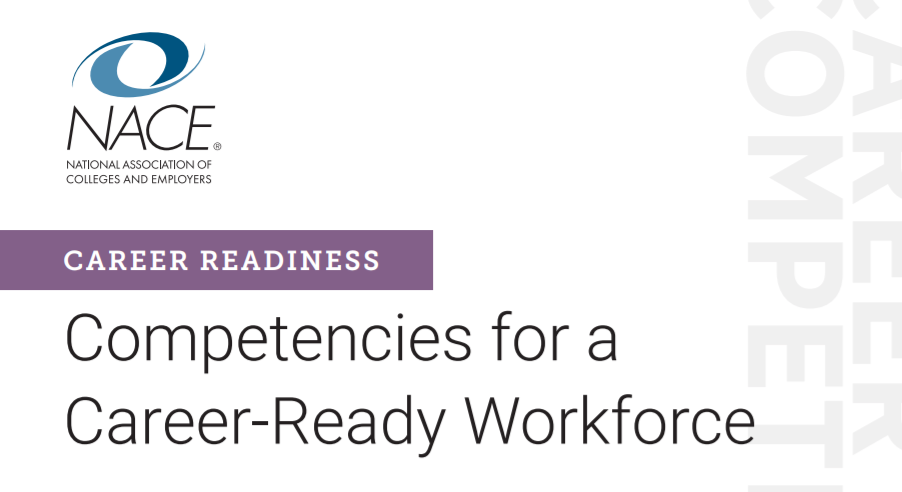Skills Employers Are Looking For (NACE Career Competencies)
For new college graduates, career readiness is key to ensuring successful entrance into the workforce. Career readiness is the foundation upon which a successful career is launched. Career readiness is, quite simply, the new career currency. There are eight career readiness competencies, each of which can be demonstrated in a variety of ways. Review a definition of each competency below as well as learn more about how to develop each skill.
- Career & Self Development
- Communication
- Critical Thinking
- Equity & Inclusion
- Leadership
- Professionalism
- Teamwork
- Technology
- Definition: Proactively develop oneself and one’s career through continual personal and professional learning, awareness of one’s strengths and weaknesses, navigation of career opportunities, and networking to build relationships within and without one’s organization.Sample Behaviors:
– Identify areas for continual growth while pursuing and applying feedback
– Develop plans and goals for one’s future career
– Professionally advocate for oneself and others
– Display curiosity; seek out opportunities to learn
– Seek duties or positions that will help one progress professionally
– Establish, maintain, and/or leverage relationships with people who can help one professionallyWays to develop this skill:
 – Complete a self-assessment: Strengths Quest, 16 Personalities, My Plan (BoA Career Services can help get you started)
– Complete a self-assessment: Strengths Quest, 16 Personalities, My Plan (BoA Career Services can help get you started)
– Apply to part-time jobs, internships, professional development conferences (Nittany Lion Careers, Additional Job Boards)
– Learn about careers: Vault, Candid Career, Careers in Your Major
– Participate in the Smeal Ethical Leadership Challenge
– Complete a LinkedIn Learning TrainingReprinted courtesy of the National Association of Colleges and Employers
- Definition: Clearly and effectively exchange information, ideas, facts, and perspectives with persons inside and outside of an organization (written, verbal, non-verbal/body language).Sample Behaviors:
– Ask appropriate questions for specific information from supervisors, specialists, and others
– Employ active listening, persuasion, and influencing skills
– Frame communication with respect to the diversity of learning styles, varied individual communication abilities, and cultural differencesWays to develop this skill:
 – Network with professionals: LinkedIn, LionLink
– Network with professionals: LinkedIn, LionLink
– Schedule a BCC appointment to practice your interview skills and perfect your resume (Nittany Lion Careers)
– Participate in the Smeal Ethical Leadership Challenge
– Complete an online training: Coursera, LinkedIn Learning
Reprinted courtesy of the National Association of Colleges and Employers
- Definition: Identify and respond to needs based upon an understanding of situational context and logical analysis of relevant information.Sample Behaviors:
– Make decisions and solve problems using sound, inclusive reasoning and judgment
– Gather and analyze information from a diverse set of sources and individuals to fully understand a problem
– Proactively anticipate needs, prioritize action steps, and multi-task in a fast-paced environment
– Accurately summarize and interpret data with an awareness of personal biases that may impact outcomes
– Effectively communicate actions and rationale, recognizing the diverse perspectives and lived experiences of stakeholdersWays to develop this skill:
 – Participate in a case competition (nittanylioncareers.psu.edu – search {job shadow, case competition, conferences)
– Participate in a case competition (nittanylioncareers.psu.edu – search {job shadow, case competition, conferences)
– Assist in research opportunities
– Enroll in Penn State classes or a minor that focuses on data and analysis
– Student organizations – participate in working groups that focus on business content, trends, and issues
– Complete a LinkedIn Learning TrainingReprinted courtesy of the National Association of Colleges and Employers
- Definition: Demonstrate the awareness, attitude, knowledge, and skills required to equitably engage and include people from different local and global cultures. Engage in anti-racist practices that actively challenge the systems, structures, and policies of racism.Sample Behaviors:
– Seek global cross-cultural interactions and experiences that enhance one’s understanding of people from different demographic groups and that leads to personal growth
– Keep an open mind to diverse ideas and new ways of thinking
– Use feedback from multiple cultural perspectives to make inclusive and equity-minded decisionsWays to develop this skill:
 – Review diversity & community resources, including potential courses at Penn State
– Review diversity & community resources, including potential courses at Penn State
– Participate in diversity-focused events at Penn State
– Enroll in Penn State classes or a minor that focuses on data and analysis
– Communicate and take an interest in learning about people’s differences
– Complete a diversity-focused LinkedIn training
Reprinted courtesy of the National Association of Colleges and Employers - Definition: Recognize and capitalize on personal and team strengths to achieve organizational goalsSample Behaviors:
– Use innovative thinking to go beyond traditional methods
– Serve as a role model to others by approaching tasks with confidence and a positive attitude
– Motivate and inspire others by encouraging them and by building mutual trust
– Plan, initiate, manage, complete, and evaluate projectsWays to develop this skill:
 – Join and take on extra duties and responsibilities in a student organization (committees, special projects, executive roles)
– Join and take on extra duties and responsibilities in a student organization (committees, special projects, executive roles)
– Apply for a leadership position within part-time jobs (crew leader, liaison, mentor, coach, etc)
– Complete a leadership training (Truist Leadership Certificate, LinkedIn Learning, Penn State Leadership Trainings)
– Participate in the Smeal Ethical Leadership Challenge
– Find opportunities through the Engagement NetworkReprinted courtesy of the National Association of Colleges and Employers
- Definition: Knowing work environments differ greatly understand and demonstrate effective work habits, and act in the interest of the larger community and workplaceSample Behaviors:
– Maintain a positive personal brand in alignment with organizational and personal career values
– Show a high level of dedication toward doing a good job
– Demonstrate dependability (e.g., report consistently for work or meetings)
– Prioritize and complete tasks to accomplish organizational goals
– Consistently meet or exceed goals and expectations.Ways to develop this skill:
 – LinkedIn Learning Training
– LinkedIn Learning Training
– Apply for underclassmen leadership programs/externships/conferences, internships and, jobs (nittanylioncareers.psu.edu)
– Network with employers at events
– Participate in the Smeal Ethical Leadership Challenge
– Stay up on school work and projects
– Manage a positive social media presenceReprinted courtesy of the National Association of Colleges and Employers
- Definition: Build and maintain collaborative relationships to work effectively toward common goals, while appreciating diverse viewpoints and shared responsibilitiesSample Behaviors:
– Listen carefully to others, taking time to understand and ask appropriate questions without interrupting
– Effectively manage conflict, interact with and respect diverse personalities, and meet ambiguity with resilience
– Be accountable for individual and team responsibilities and deliverables
– Employ personal strengths, knowledge, and talents to complement those of others
– Exercise the ability to compromise and be agile – Collaborate with others to achieve common goals – Build strong, positive working relationships with supervisor and team members/coworkersWays to develop this skill:
 – LinkedIn Learning Training
– LinkedIn Learning Training
– Join a case competition (nittanylioncareers.psu.edu) – search under ‘Job Shadow/Externships/Conferences
– Actively participate in school group projects, student organization committees, and special projects
– Get a part-time job that allows you to work on a teamReprinted courtesy of the National Association of Colleges and Employers
- Definition: Understand and leverage technologies ethically to enhance efficiencies, complete tasks, and accomplish goalsSample Behaviors:
– Quickly adapt to new or unfamiliar technologies
– Identify appropriate technology for completing specific tasks
– Navigate change and be open to learning new technologies.Ways to develop this skill:
 – LinkedIn Learning Training
– LinkedIn Learning Training
– Enroll in a technology-focused course/minor
– Stay current on new and upcoming technology trends (LinkedIn, Business focused news sources)Reprinted courtesy of the National Association of Colleges and Employers


